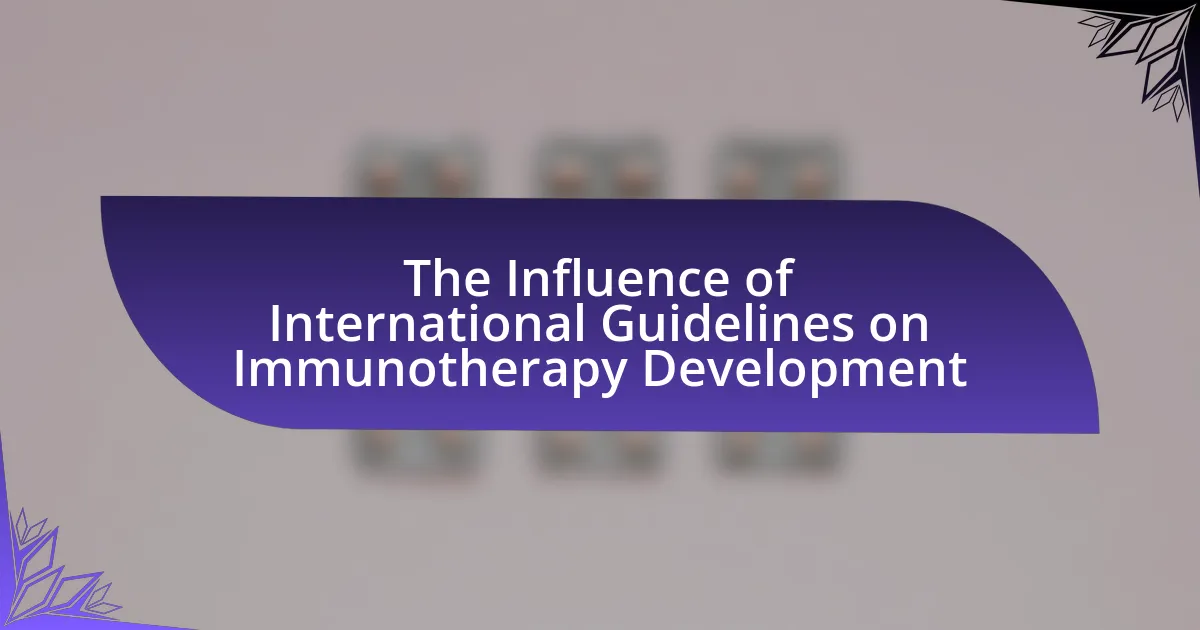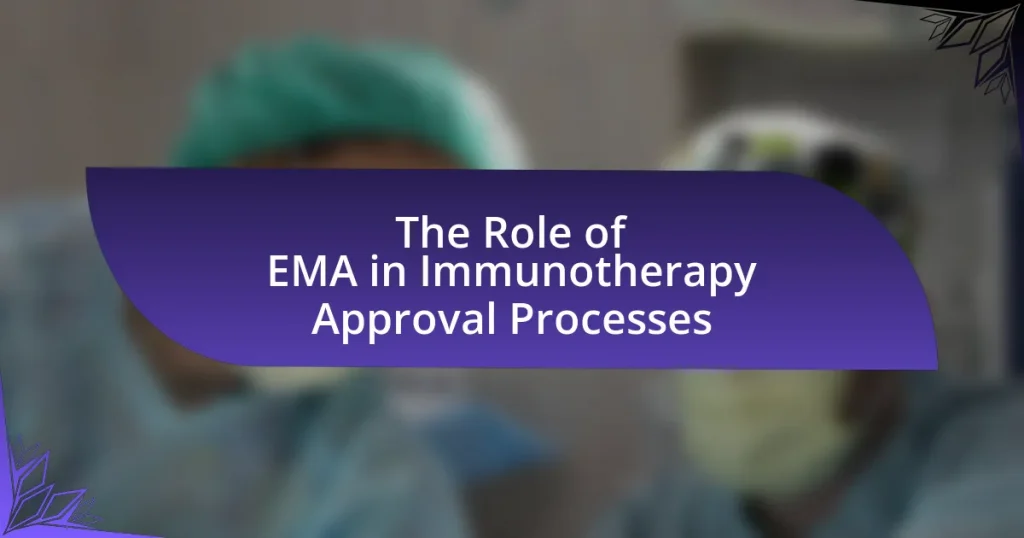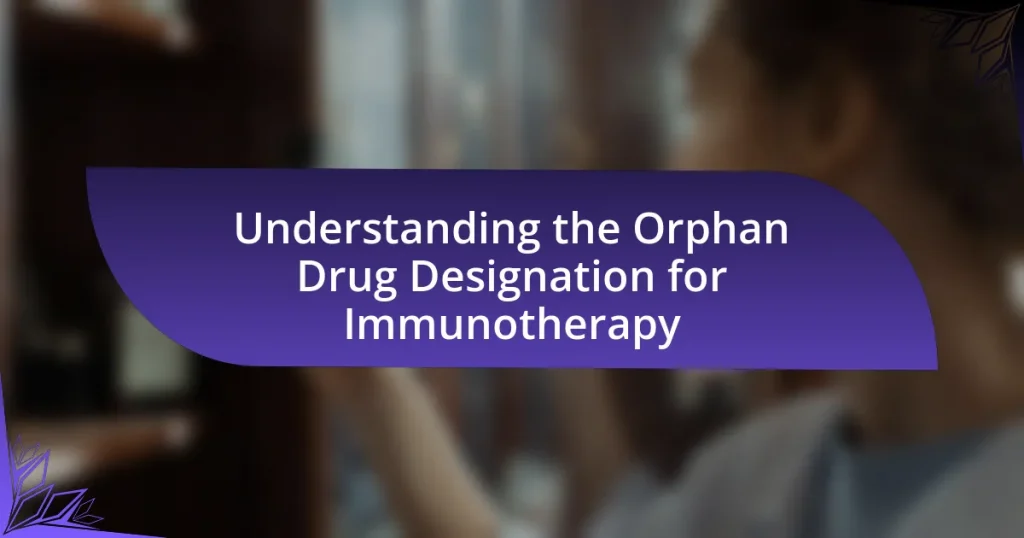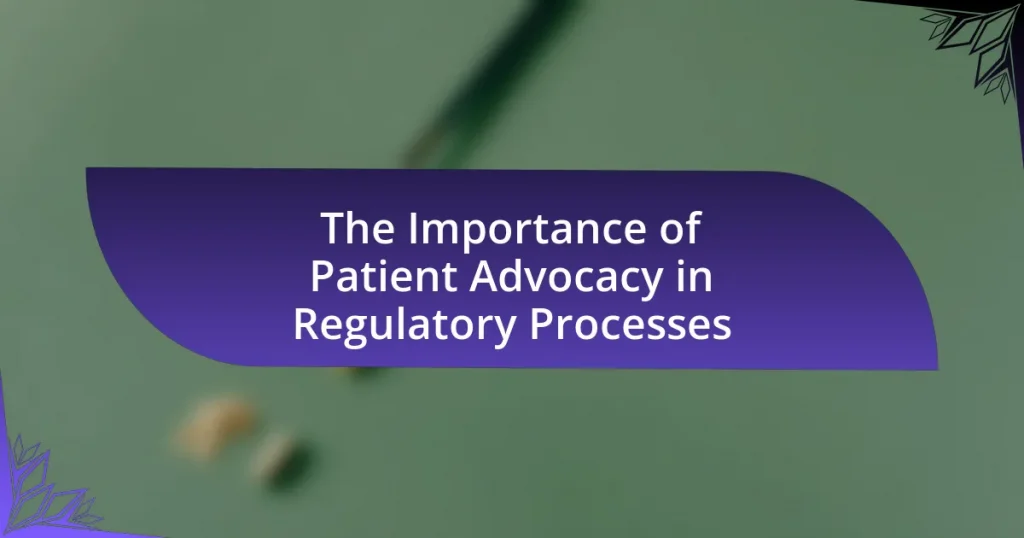The article focuses on the influence of international guidelines on the development of immunotherapy, highlighting the role of standardized recommendations from organizations such as the World Health Organization (WHO) and the International Council for Harmonisation (ICH). It discusses how these guidelines shape clinical trial design, regulatory approval processes, and patient management, ensuring safety and efficacy in immunotherapy research. Key organizations involved in setting these guidelines are identified, along with the ethical considerations they address, the challenges researchers face in adhering to them, and the opportunities they create for innovation and collaboration in the field. The article emphasizes the importance of compliance with these guidelines to enhance the credibility and effectiveness of immunotherapy treatments.
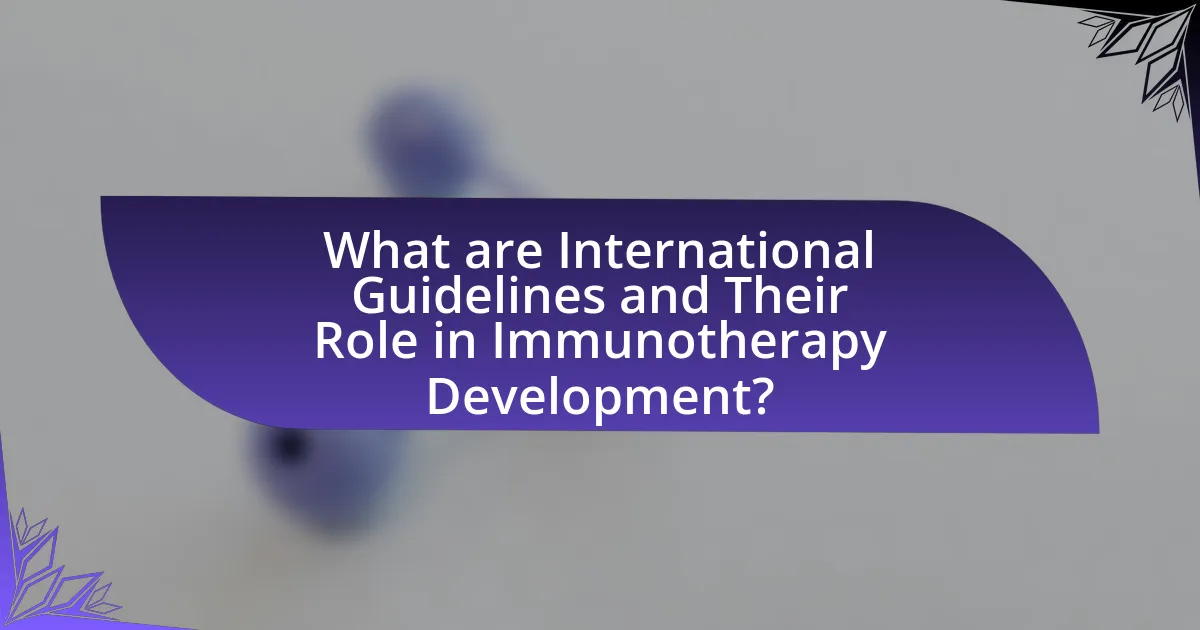
What are International Guidelines and Their Role in Immunotherapy Development?
International guidelines are standardized recommendations developed by expert organizations to ensure the safety, efficacy, and ethical conduct of immunotherapy research and application. These guidelines play a crucial role in immunotherapy development by providing a framework for clinical trial design, regulatory approval processes, and best practices for patient management. For instance, the International Council for Harmonisation (ICH) and the World Health Organization (WHO) establish guidelines that help harmonize regulatory requirements across countries, facilitating faster access to innovative therapies. Additionally, adherence to these guidelines can enhance the credibility of research findings, as seen in the consistent application of Good Clinical Practice (GCP) standards, which ensures that trials are conducted ethically and scientifically sound.
How do international guidelines influence the research and development of immunotherapy?
International guidelines significantly shape the research and development of immunotherapy by establishing standardized protocols and best practices that ensure safety and efficacy. These guidelines, such as those from the World Health Organization and the European Medicines Agency, provide frameworks for clinical trial design, patient eligibility criteria, and outcome measures, which streamline the regulatory approval process. For instance, adherence to these guidelines can lead to faster approval times for new immunotherapeutic agents, as seen with checkpoint inhibitors, which have been rapidly integrated into treatment regimens following guideline endorsement. Furthermore, international guidelines facilitate collaboration among researchers and institutions, promoting data sharing and harmonization of research efforts across borders, ultimately accelerating advancements in immunotherapy.
What are the key international organizations involved in setting these guidelines?
The key international organizations involved in setting guidelines for immunotherapy development include the World Health Organization (WHO), the International Society for Cell and Gene Therapy (ISCT), and the European Medicines Agency (EMA). These organizations play crucial roles in establishing standards and protocols that govern the research, development, and approval processes for immunotherapies. For instance, the WHO provides global health guidelines that influence national policies, while the EMA evaluates and monitors medicinal products in the European Union, ensuring safety and efficacy. The ISCT focuses on advancing cell and gene therapies through scientific and regulatory guidance, contributing to the overall framework for immunotherapy development.
How do these guidelines ensure safety and efficacy in immunotherapy trials?
International guidelines ensure safety and efficacy in immunotherapy trials by establishing standardized protocols for trial design, patient selection, and monitoring. These guidelines, such as those from the International Council for Harmonisation (ICH) and the Food and Drug Administration (FDA), mandate rigorous preclinical testing and phased clinical trials to assess both safety and therapeutic effectiveness. For instance, the ICH E6 guideline emphasizes Good Clinical Practice (GCP), which requires informed consent, ethical considerations, and comprehensive reporting of adverse events. This structured approach minimizes risks to participants and enhances the reliability of trial outcomes, ultimately leading to more effective immunotherapy treatments.
Why are international guidelines essential for regulatory approval of immunotherapies?
International guidelines are essential for regulatory approval of immunotherapies because they establish standardized criteria for safety, efficacy, and quality. These guidelines, developed by organizations such as the International Council for Harmonisation (ICH) and the World Health Organization (WHO), provide a framework that ensures consistent evaluation across different jurisdictions. This consistency is crucial as it facilitates the global acceptance of clinical trial data, reduces duplication of efforts, and accelerates the approval process. For instance, adherence to these guidelines can lead to faster market access for innovative therapies, as seen in the expedited approvals of several CAR T-cell therapies that followed established international protocols.
What processes do these guidelines establish for clinical trial design?
These guidelines establish processes for clinical trial design that include defining objectives, selecting appropriate endpoints, and determining sample size. Specifically, they emphasize the importance of aligning trial designs with regulatory requirements and scientific standards to ensure the validity and reliability of results. For instance, the International Council for Harmonisation (ICH) guidelines provide a framework for Good Clinical Practice (GCP), which mandates that trials must be scientifically sound and ethically conducted, thereby enhancing the credibility of immunotherapy research outcomes.
How do guidelines impact the timeline for bringing immunotherapies to market?
Guidelines significantly impact the timeline for bringing immunotherapies to market by establishing regulatory frameworks that dictate the development process. These guidelines, such as those from the FDA and EMA, outline the necessary preclinical and clinical trial requirements, which can streamline or prolong the approval process. For instance, adherence to specific protocols can expedite the review timeline, as seen with the FDA’s Breakthrough Therapy designation, which aims to accelerate the development of drugs that treat serious conditions. Conversely, stringent guidelines can lead to delays if additional data or studies are required, as evidenced by the extended timelines for therapies that fail to meet initial regulatory expectations. Thus, the nature and rigor of guidelines directly influence both the speed and efficiency of immunotherapy market entry.
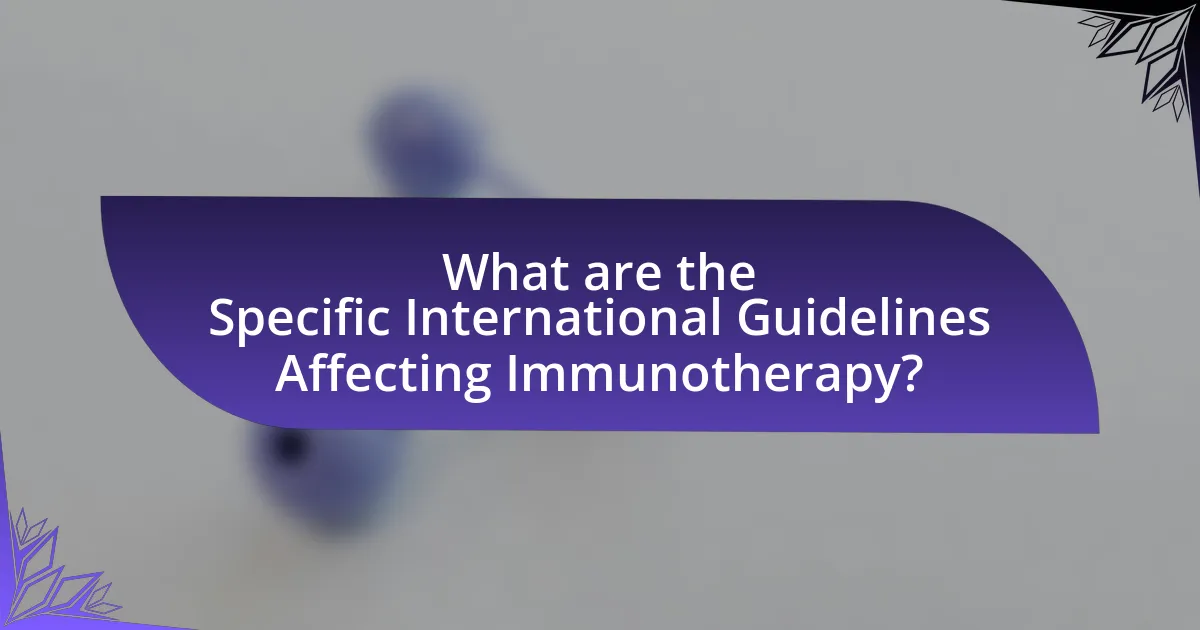
What are the Specific International Guidelines Affecting Immunotherapy?
The specific international guidelines affecting immunotherapy include the European Medicines Agency (EMA) guidelines, the U.S. Food and Drug Administration (FDA) regulations, and the World Health Organization (WHO) recommendations. The EMA provides a framework for the evaluation and approval of immunotherapeutic agents in Europe, emphasizing the need for robust clinical trial data demonstrating safety and efficacy. The FDA outlines similar requirements, focusing on the necessity of preclinical studies and phase trials to assess the therapeutic potential of immunotherapies. Additionally, the WHO offers global health guidelines that influence the development and accessibility of immunotherapy, particularly in low- and middle-income countries. These guidelines collectively shape the regulatory landscape for immunotherapy, ensuring that treatments are both effective and safe for patients.
What are the main types of international guidelines relevant to immunotherapy?
The main types of international guidelines relevant to immunotherapy include clinical practice guidelines, consensus statements, and regulatory guidelines. Clinical practice guidelines, such as those from the American Society of Clinical Oncology (ASCO) and the European Society for Medical Oncology (ESMO), provide evidence-based recommendations for the use of immunotherapy in specific cancer types. Consensus statements, often developed by expert panels, summarize expert opinions on best practices in immunotherapy. Regulatory guidelines, issued by organizations like the U.S. Food and Drug Administration (FDA) and the European Medicines Agency (EMA), outline the requirements for the approval and monitoring of immunotherapeutic agents. These guidelines collectively shape the standards for immunotherapy development and application in clinical settings.
How do guidelines differ between various regions, such as the US and Europe?
Guidelines for immunotherapy development differ significantly between the US and Europe primarily due to regulatory frameworks and approval processes. In the US, the Food and Drug Administration (FDA) emphasizes a more flexible approach, allowing for accelerated approval pathways based on surrogate endpoints, which can expedite access to therapies. Conversely, the European Medicines Agency (EMA) typically requires more comprehensive clinical data before granting approval, focusing on long-term efficacy and safety, which can prolong the timeline for new treatments to reach the market. This divergence is evident in the approval of specific immunotherapies, where the FDA may approve a drug based on early-phase trial results, while the EMA may wait for results from larger, more definitive trials.
What role do guidelines play in the standardization of immunotherapy protocols?
Guidelines play a crucial role in the standardization of immunotherapy protocols by providing evidence-based recommendations that ensure consistency in treatment approaches across different healthcare settings. These guidelines are developed through comprehensive reviews of clinical data and expert consensus, which helps to align practices with the latest scientific findings. For instance, the National Comprehensive Cancer Network (NCCN) guidelines offer specific protocols for various cancers, which have been shown to improve patient outcomes by reducing variability in treatment. This standardization facilitates better communication among healthcare providers and enhances the overall quality of care delivered to patients undergoing immunotherapy.
How do international guidelines address ethical considerations in immunotherapy research?
International guidelines address ethical considerations in immunotherapy research by establishing frameworks that prioritize patient safety, informed consent, and equitable access to treatments. For instance, the Declaration of Helsinki emphasizes the necessity of obtaining informed consent from participants, ensuring they understand the risks and benefits associated with immunotherapy trials. Additionally, the International Council for Harmonisation (ICH) Good Clinical Practice guidelines mandate that researchers assess the ethical implications of their studies, including the potential for exploitation of vulnerable populations. These guidelines collectively aim to uphold ethical standards, protect participants’ rights, and promote integrity in research practices, thereby fostering trust in the development of immunotherapies.
What ethical frameworks are established by these guidelines?
The ethical frameworks established by these guidelines include principles of beneficence, non-maleficence, autonomy, and justice. These frameworks guide the development and application of immunotherapy by ensuring that patient welfare is prioritized, risks are minimized, informed consent is obtained, and equitable access to treatments is provided. For instance, the Declaration of Helsinki emphasizes the importance of informed consent and the need to balance risks and benefits in clinical research, reinforcing the ethical obligation to protect participants while advancing medical knowledge.
How do guidelines ensure informed consent in immunotherapy trials?
Guidelines ensure informed consent in immunotherapy trials by establishing standardized protocols that require clear communication of risks, benefits, and alternatives to participants. These guidelines, such as those from the International Conference on Harmonisation (ICH) and the Declaration of Helsinki, mandate that researchers provide comprehensive information in understandable language, allowing participants to make informed decisions. For instance, the ICH E6(R2) Good Clinical Practice guidelines emphasize the necessity of obtaining voluntary consent without coercion, ensuring that participants are fully aware of the trial’s nature and their rights. This structured approach enhances ethical standards and protects participant autonomy in clinical research.
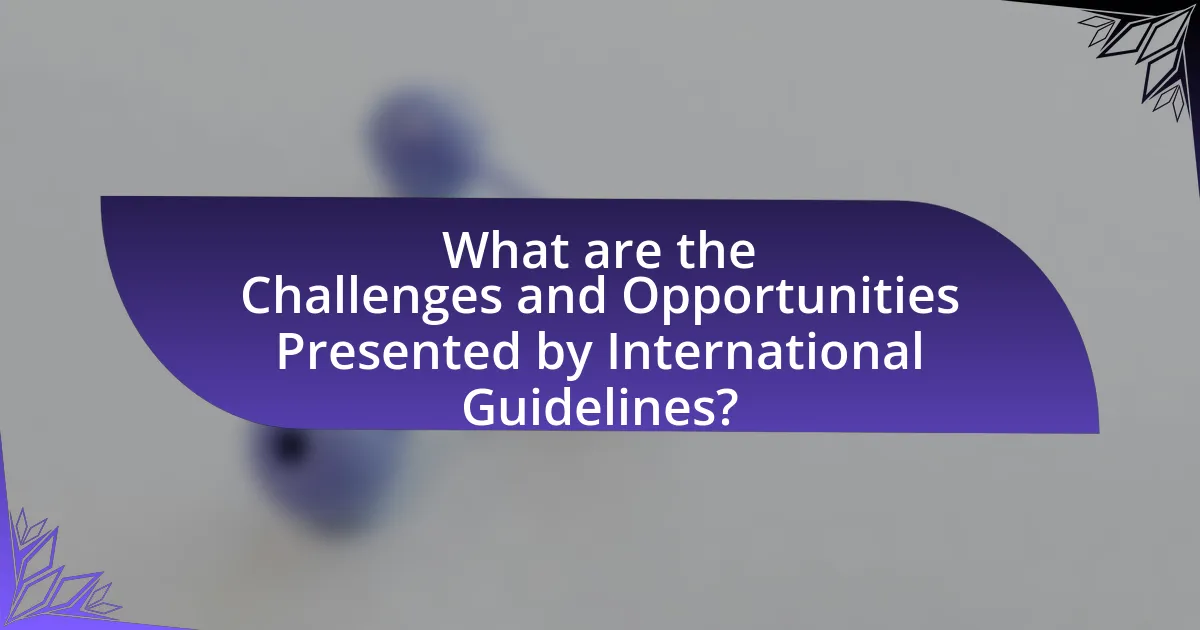
What are the Challenges and Opportunities Presented by International Guidelines?
International guidelines present both challenges and opportunities in the context of immunotherapy development. The challenges include variability in guideline interpretation across different regions, which can lead to inconsistencies in clinical practice and regulatory approval processes. For instance, the European Medicines Agency and the U.S. Food and Drug Administration may have differing requirements for clinical trial designs, impacting the global applicability of research findings.
Conversely, opportunities arise from the establishment of standardized protocols that can enhance collaboration among researchers and streamline the regulatory process. For example, adherence to international guidelines can facilitate multi-center trials, allowing for larger patient populations and more robust data collection, ultimately accelerating the development of effective immunotherapies. This duality of challenges and opportunities underscores the critical role that international guidelines play in shaping the landscape of immunotherapy research and implementation.
What challenges do researchers face in adhering to international guidelines?
Researchers face several challenges in adhering to international guidelines, primarily due to variability in regulatory requirements across different countries. This inconsistency can lead to confusion and difficulties in compliance, as researchers must navigate diverse legal frameworks and ethical standards. For instance, the International Council for Harmonisation of Technical Requirements for Pharmaceuticals for Human Use (ICH) provides guidelines that may not align with local regulations, complicating the approval process for immunotherapy studies. Additionally, researchers often encounter resource limitations, such as insufficient funding or lack of access to necessary training, which can hinder their ability to implement these guidelines effectively. These challenges can ultimately impact the quality and consistency of research outcomes in the field of immunotherapy development.
How can discrepancies between guidelines in different countries affect research?
Discrepancies between guidelines in different countries can significantly hinder research by creating inconsistencies in study design, regulatory approval processes, and data interpretation. For instance, varying eligibility criteria for clinical trials can lead to challenges in patient recruitment, ultimately affecting the generalizability of research findings. A study published in the Journal of Clinical Oncology by Hwang et al. (2020) highlighted that differing regulatory requirements between the U.S. and Europe resulted in delays for immunotherapy trials, impacting timely access to new treatments. Such discrepancies can also complicate the comparison of results across studies, as variations in endpoints and methodologies may lead to conflicting conclusions, thereby undermining the overall advancement of immunotherapy development.
What strategies can be employed to navigate these challenges?
To navigate the challenges in immunotherapy development influenced by international guidelines, stakeholders can adopt a multi-faceted approach that includes collaboration, adherence to regulatory frameworks, and continuous education. Collaboration among researchers, regulatory bodies, and pharmaceutical companies fosters knowledge sharing and accelerates innovation. Adhering to established regulatory frameworks, such as those set by the FDA and EMA, ensures compliance and facilitates smoother approval processes. Continuous education on evolving guidelines and scientific advancements equips professionals with the necessary tools to adapt to changes in the landscape of immunotherapy. These strategies are supported by the increasing emphasis on global cooperation in clinical trials, as highlighted in the International Council for Harmonisation’s guidelines, which aim to streamline processes and enhance the quality of immunotherapy research.
What opportunities do international guidelines create for innovation in immunotherapy?
International guidelines create significant opportunities for innovation in immunotherapy by establishing standardized protocols that facilitate research collaboration and regulatory approval. These guidelines promote consistency in clinical trial designs, enabling researchers to compare results across studies and accelerate the development of new therapies. For instance, the adoption of guidelines from organizations like the American Society of Clinical Oncology (ASCO) and the European Society for Medical Oncology (ESMO) has led to increased investment in immunotherapy research, as companies can better predict the regulatory landscape and market potential. Furthermore, these guidelines often encourage the integration of novel biomarkers and combination therapies, driving innovation by allowing for more personalized treatment approaches.
How can collaboration between countries enhance immunotherapy development?
Collaboration between countries can enhance immunotherapy development by facilitating the sharing of research, resources, and clinical trial data. This cooperative approach allows for a more diverse patient population in clinical trials, which can lead to more robust and generalizable results. For instance, multinational clinical trials can accelerate the testing of new immunotherapies, as seen in the collaboration between the United States and European countries in the development of checkpoint inhibitors, which has significantly advanced treatment options for various cancers. Additionally, shared funding and expertise can lead to innovative solutions and faster regulatory approvals, as evidenced by the collaborative efforts in the Global Alliance for Vaccines and Immunization, which has successfully improved vaccine development and distribution worldwide.
What role do guidelines play in fostering global partnerships in research?
Guidelines play a crucial role in fostering global partnerships in research by establishing standardized protocols that enhance collaboration and ensure consistency across diverse research environments. These guidelines facilitate communication among international research teams, enabling them to align their objectives and methodologies, which is essential for the successful development of complex therapies like immunotherapy. For instance, the International Council for Harmonisation of Technical Requirements for Pharmaceuticals for Human Use (ICH) provides a framework that harmonizes regulatory requirements, thereby promoting cooperation among researchers from different countries. This harmonization is vital for accelerating the development and approval of new treatments, as it reduces discrepancies in research practices and regulatory submissions, ultimately leading to more efficient and effective global partnerships.
What Best Practices Should Researchers Follow to Align with International Guidelines?
Researchers should adhere to ethical standards, ensure transparency, and engage in rigorous peer review to align with international guidelines. Ethical standards, such as those outlined by the Declaration of Helsinki, mandate informed consent and the welfare of participants, which are critical for compliance. Transparency in reporting results, including both positive and negative findings, fosters trust and reproducibility, as emphasized by the CONSORT guidelines for clinical trials. Engaging in rigorous peer review processes, as recommended by the International Committee of Medical Journal Editors, ensures that research meets high scientific standards and aligns with global expectations. These practices collectively enhance the credibility and integrity of immunotherapy research within the framework of international guidelines.
How can researchers stay updated on changes in international guidelines?
Researchers can stay updated on changes in international guidelines by regularly consulting official publications from relevant organizations such as the World Health Organization (WHO), the European Medicines Agency (EMA), and the U.S. Food and Drug Administration (FDA). These organizations frequently release updates and revisions to guidelines that impact immunotherapy development. Additionally, subscribing to professional journals and attending conferences in the field of immunotherapy allows researchers to access the latest information and discussions surrounding guideline changes. For instance, the WHO publishes updates on global health guidelines that can directly influence research protocols and practices.
What resources are available to assist researchers in compliance with these guidelines?
Resources available to assist researchers in compliance with international guidelines on immunotherapy development include regulatory agency websites, such as the FDA and EMA, which provide detailed guidance documents. Additionally, professional organizations like the American Society of Clinical Oncology (ASCO) and the European Society for Medical Oncology (ESMO) offer educational materials and workshops focused on compliance. Furthermore, academic institutions often have compliance offices that provide support and resources tailored to specific guidelines. These resources are essential for ensuring adherence to established protocols and enhancing the quality of research in immunotherapy.
